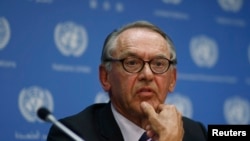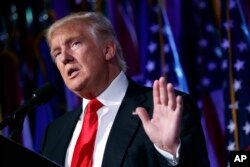U.S. President-elect Donald Trump’s reported aversion to the United Nations has come under fire by U.N. Deputy Secretary-General Jan Eliasson, who expressed concern that a Trump administration could undermine the Paris Climate Change Agreement and U.N. efforts to restrain the growth of xenophobia around the world.
Nevertheless, the Swedish diplomat, who will be leaving his post at the end of the year, said he hoped that negative comments made by Trump proved to be exaggerations.
“I have personally met Mr. Trump earlier in my roles both at the U.N. and as ambassador to Washington and at that time I did not discover such a hostile attitude to the United Nations.”
Eliasson noted that the United States was a founding member of the United Nations and has been a pillar and main contributor to all areas of its work, including peacekeeping, humanitarian action and standing up for human rights and the rule of law.
At the same time, he said the U.S. has been a beneficiary of the world body’s ability to act as an arbiter in many critical issues.
”Peacekeeping is an institution, an element that can often help to make sure that there is a neutral party that can deal with a situation rather than immediate military involvement by major powers,” he said.
”I am sure that the American side, whatever political color, would like to see a comprehensive work on dealing with terrorism in all its aspects. There, we have the machinery also in its broader sense.”
While saying it was in the self-interest of the United States to remain engaged with the U.N., Eliasson told VOA he was concerned about the ramifications of the U.S. opting out of the climate change agreement, which he called “an existential threat.”
“The Paris agreement has entered into force on the fourth of November, so the agreement is not in danger,” he said. “But, of course, if member states do not live up to the intentions and commitments of that agreement, we will have trouble, especially if it is a country of the size of the United States.”
Eliasson also expressed concern that the burgeoning refugee and migration crisis was increasing antipathy toward foreigners around the world. He noted that there were 244 million international migrants, 40 million internally displaced people and 25 million refugees in the world.
”I think one of the most dangerous trends in the world right now is to divide the world people into us and them and putting lower quality on the them and higher quality on the us,” he said. “That goes completely counter to the basic values and principles of the United Nations.”
Under Secretary-General Eliasson said he hoped the United States would remain committed to the United Nations' campaign to combat xenophobia.
Syria
Touching on another global issue, Eliasson said he was very worried about the escalating conflict in Syria and saw no signs that political negotiations to end the war were imminent.
In response to a question from VOA regarding the often-clashing views of the United States and Russia on how the war in Syria should be waged, Eliasson acknowledged the tensions between the two military powers and said improving the dialogue between them would be good for everyone.
”We know very well that both the United States and Russia are interested in fighting or dealing with terrorists," he said. "But on the other hand, it is important that nobody, including the United States and Russia, lose the perspective that we need to have a fair solution through a political process and that that goal should not be deserted or left behind.”
Sudan, South Sudan
From 2007 to 2008, Eliasson was a special U.N. envoy to Darfur in Sudan. He said he was hopeful when South Sudan gained its independence in 2011, a hope that was dashed when he saw how that situation has developed.
Eliasson said he was concerned that Russia and China would probably veto a Security Council resolution proposed by the United States to impose an arms embargo on the African country.
”I certainly believe that arms flowing into any country in conflict is a negative factor. And, I would hope that the discussions are not finalized,” he said. ”From the side of the United Nations, we have been truly in favor, of course, in closing the arms trade. It is a very negative and damaging element in the already troubled situation.”
Since civil war broke out in December 2013 in South Sudan, the United Nations reports tens of thousands of people have been killed and nearly 3 million have become internally displaced or refugees in neighboring countries.













